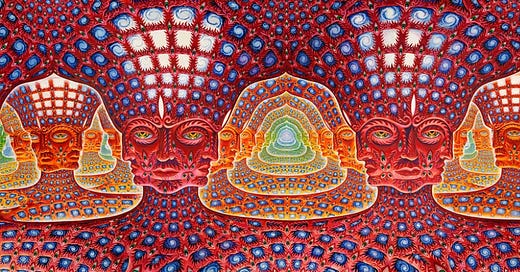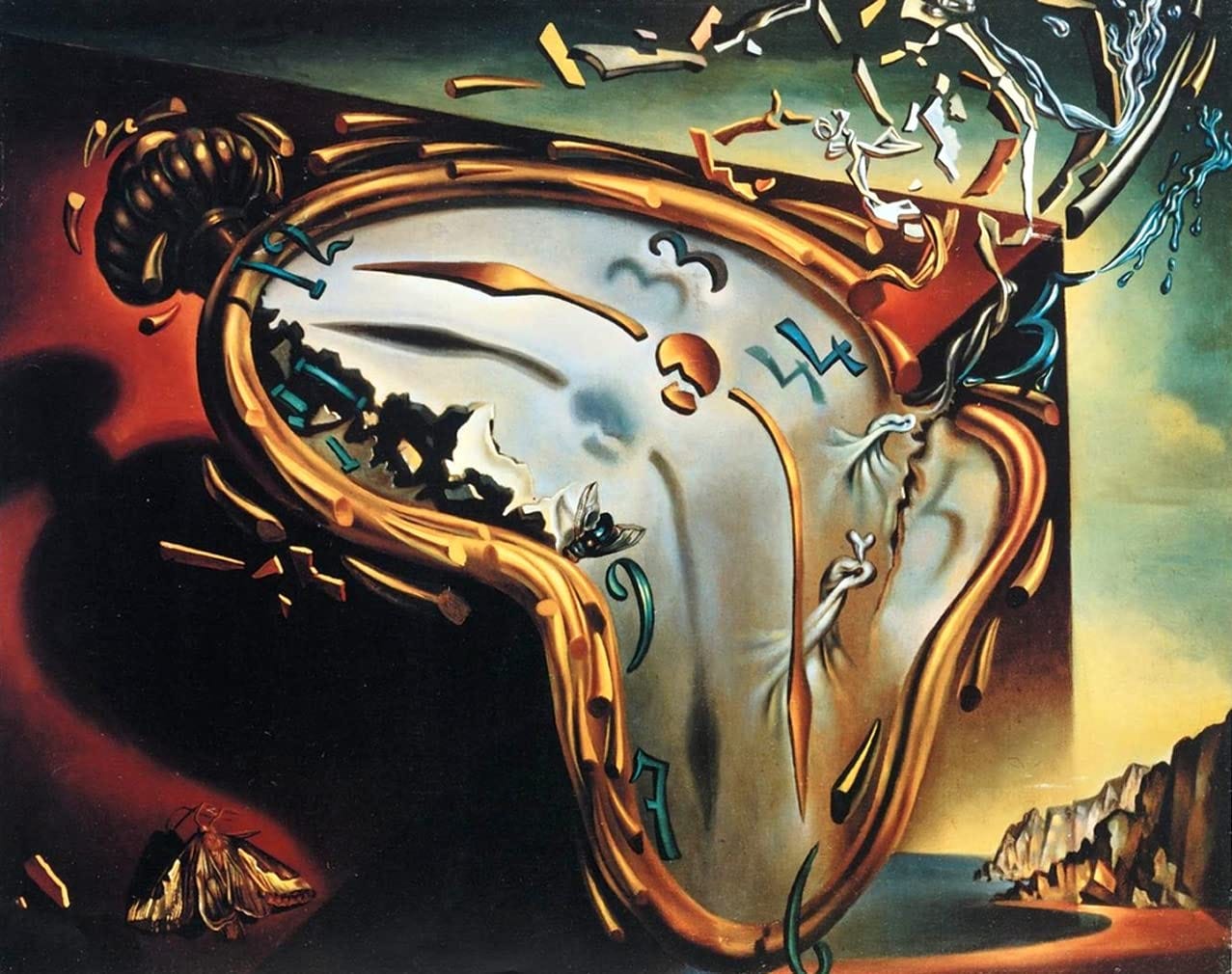Last week we covered four plausible explanations for Where the Information Comes From in non-ordinary states.
Expanded Umwelts (the realm our senses can perceive) and faster data processing of the bitstream flooding past us every second.
Epigenetic signals passed down from parents expressed in our own bodies and minds.
Our own DNA serving as a hard drive for the periodic table of the universe that we might be able to read in clumsy/intuitive ways.
A non-local source of all that inspiration–information as the fundamental substrate of the universe that we are just decoding that infinite signal with the “receiver” of our brains.
There are other more outlandish explanations too which we didn’t get into. You’re welcome to consider any and all once you’ve hopped across the stepping stones from consensus reality! (that way you can always retrace your steps to Terra Firmer if things get too weird)
But for most of us, what’s more helpful than hoping we will crack the code of Life, the Universe and Everything, is simply figuring out some basic ground rules for our own explorations.
So as we ponder the Yonder, make sure we don’t wander too far.
That way we reduce the chances of getting lost, or becoming a casualty someone else has to rescue downstream.
Because playing in the Deep End isn’t without it's hazards. From our oldest myths, to our current newsfeeds, there’s no shortage of cautionary tales about those who’ve reached for the Secret too soon and gone tits up.
To be fair though, Icarus should never have been reduced to a moralist’s tale– “He should have known his place and not flown so close to the sun!”
His adventure should have been considered a test-pilot’s experiment– “Wings worked! (Better use glue instead of wax next time)”
So here are five ways to affix our wings more securely, and avoid the crash and burn of those pioneering pilots who’ve come (and gone) before us.
***
#1 Beware Ontological Addiction
Most of us are familiar with the concepts of physical and psychological addiction. In the former, you need to increase the dosage of a given substance or behavior to get similar results, and when you remove the high, you have physical withdrawal symptoms, ranging from nausea to organ failure.
In the latter, you might develop an emotional dependence or habituation, and when you remove the high you experience irritability, distractedness, or insomnia. Pushing all the buttons of our reward circuitry (a key technique for accessing non-ordinary states) works better than most people imagine and can create reinforcement loops that can quickly become habitual
But there is a third variation we should also consider when chasing peak states—ontological addiction.
That is where the information or insights gleaned from a given set of practices prove so compelling that they override normal checks and balances.
In Harry Potter and the Philosopher’s Stone, the young boy finds a magic mirror of Erised (“desire” spelled backward) that only reflects what someone yearns for most in the world.
But the wizard Dumbledore cautions him: “Men have wasted away before it, not knowing if what they have seen is real, or even possible. . . . It does not do to dwell on dreams and forget to live, remember that., Harry!”
Hedonic Engineering–the deliberate tuning of peak states–polishes that magic mirror. If you’re not careful, you can get blinded by the light.
When you intentionally hot-wire the full suite of evolutionary drivers in our bodies and brains, you may trigger stronger results than you intended. The only difference between a delightful flow state and a destructive compulsion is its positive or negative impact on one’s life.
Put bluntly, the only difference between an alchemist and an addict is the scoreboard.
#2 It’s Not About You
First identified back in the 1930s, “Jerusalem Syndrome” is a temporary fit of madness brought on by a visit to one of the world’s holiest cities. It’s like an overdose of spiritual awe, where geological time, historical significance and religious potency team up to overwhelm the unprepared.
Occasionally, it afflicts people with pre-existing mental conditions; mostly it hits people with devout religious beliefs. But every now and again, it fells average tourists.
You could call it a Messiah Complex, and you wouldn’t be wrong. The Messiahs come in droves. But so do Virgin Marys and King Davids and, at least, one Samson—the latter proving his virility by smashing through a wall at the psychiatric hospital on the western edge of the Old City. They show up every year, especially during Christmas, Easter and Passover.
There are thousands of cases on record, pilgrims who visit Jerusalem and get kicked out of reality by the weight of all that holy history. So rather than deciding, “Wow, I just had a mystical experience where I felt like Jesus Christ!” they conclude, “Wow, I am Jesus Christ. Clear the decks, people, I’ve got things to do!”
Psychologists call this reaction “extreme ego inflation.” Often, the experience of selflessness is so powerfully new and utterly compelling that it feels like no one else has ever felt this way before—that it’s evidence of some kind of sacred anointment. When triggered by an awe-inspiring encounter with the Wailing Wall, the result is Jerusalem Syndrome.
But the same thing can happen with any ecstatic encounter. It’s why Burning Man advises people to not make any life changing decisions while at the event or in the first month following it, and why online psychedelic message boards like Erowid are filled with advice like: “Don’t believe everything you think.”
Lately, we’ve started to get a handle on where this ego-inflation comes from. In ecstatic states, dopamine skyrockets, while activity in the prefrontal cortex plunges. Suddenly, we’re finding connections between ideas that we’ve never even thought of before.
Some of those connections are legitimate insights; others are mere flights of fancy. In 2002, for example, Swiss neurologist Peter Brugger discovered that people with more dopamine in their systems are more likely to believe in secret conspiracies and alien abductions. They’re detecting patterns (known as apophenia) where most of us see none.
With the prefrontal cortex shut down, impulse control, long-term planning and critical reasoning faculties are offline too. We lose our checks and balances. Combine that with excessive dopamine telling us that the connections we’re making are radically important and must be immediately acted upon—that we’re radically important and must be listened to—and it’s not hard to imagine how this goes wrong.
So no matter what comes up, no matter how fantastical your experience, remember: It’s not about you. Take an encounter with selflessness for all that it suggests, but fold those lessons back into your everyday roles and responsibilities.
As Buddhist teacher and author Jack Kornfield reminds us, “after the ecstasy, the laundry.” Not the new Youtube channel, or mastermind retreat in Bali!
#3 It’s Not About Now
A similar issue arises when we encounter the timelessness of an altered state. Under normal conditions, with an active prefrontal cortex constantly pushing us toward the past and the future, we spend very little time living, completely, in the present. But when peak states plunges us into the Deep Now, it brings with it a sense of gravitas that may not always be warranted.
Just as selflessness can backfire and convince us we’re the Second Coming; timelessness can backfire and convince us the End Is Nigh.
This is why you get so many people returning from a trip to the ecstatic with revolutionary predictions about the importance of this particular moment in time.
We saw an example of this in the 1960s, when large swatches of the population decided it was the dawning of the Age of Aquarius. In the 1840s, it was the Seventh Day Adventists and their Doomsday scenario waiting to be whisked off to heaven from their rooftops. In 2012, it was the New Age community and their Mayan prophecy.
Contemporary psychonauts have even coined a term for this persistent distortion: Eschatothesia—literally, the perception of the Eschaton, or the end of the world.
“It is not necessarily the absolute ‘end of times,’ explains the Hyperspace Lexicon, “but can be a feeling of some huge event in the near future….a marker in time after which nothing will be the same.”
Think of it this way: at altitude, because the air is thinner, objects often appear closer than they are. Something similar happens with the altitude produced by altered states.
Under the influence of what the Greeks called “sacred time” or Kairos—that “supreme moment” where past, present and future converge—salience shoots up. Everything feels novel, important and urgent.
But once we return to “regular time” or Chronos—that linear sequence of moments where most of us live our lives—events unfold at a much slower pace. And learning to balance the immediacy of Kairos with the incremental progress of Chronos is essential if we don’t want to screw up our calculations.
Even one degree error as you plan reentry from Kairos can put you in a fundamentally different spot on the chronological calendar when you touch back down. Plus or minus a century or even a millenium in Kairos time is a rounding error. Plus or minus that long in clock time makes you look like an asshat.
When exploring altered states, you have to remember: It’s not about now.
#4 Don’t Become a Bliss Junkie
With the effortlessness that often accompanies non-ordinary states, we see a different downside. Combining all those reward neurochemicals with overflowing inspiration is intoxicating.
Once people get a taste of the effortlessness of ecstasis, they decide that this is how life is always supposed to be: a state of perpetual ease. So they become bliss junkies, state-chasers, refusing to do anything unless they can, to borrow a phrase, “go with the flow.”
While the notion that effort, hard work and persistence in the face of significant challenge plays a role in the exploration of altered states can seem a little counter-intuitive, it’s also critical.
“The obstacle is the way,” author Ryan Holiday reminds us, and this is certainly true of the ecstatic way. When you plug into these states, you get inspired about the world, and informed about yourself. If you only keep the inspiration, your self will come back to haunt you every time.
The ecstatic confronts us with the simple fact: all that “effortless effort” takes a lot of work. So by all means, feel groovy. But Don’t become a Bliss Junkie.
#5 Don’t Give Into Astonishment
The final caution addresses the overwhelming richness of altered states. It’s remarkably easy to get lost in the infinite permutations of ecstatic information technology. We can forget what we came for. Our clear intention to learn or mend or grow can get lost in the gawking overload of it all
In his book Contact, astrophysicist Carl Sagan captures the experience perfectly. When his heroine, the hard-nosed scientist Eleanor Arroway, encounters cosmic intelligence for the first time—all she manages to say is, "No— no words. No words to describe it. Poetry! They should have sent a poet..”
Alex Grey’s “Net of Being”
Fortunately, the “psychedelic bard,” Terence McKenna, had words enough for all us. “Its completely paradigm shattering. I mean union with the white light you could handle, but…having your apartment invaded by jeweled self-dribbling basketballs speaking Demotic Greek is not something you’d anticipated. Sometimes people say ‘it sounds so crazy, is it dangerous?’ The answer is, only if you fear death by astonishment.”
And while McKenna was nonchalant about that potential consequence, it matters. In the grip of mortal terror, if you leap out your apartment window to escape those self-dribbling basketballs, it’s still 32 feet per second all the way to the pavement.
Physics trumps metaphysics every time. So take it all in, but don’t forget what you came for. And most critically, Don’t Give in to Astonishment.
***
So this leaves us with five rules of thumb to carry with us into our exploration of these states.
Beware ontological addiction makes sure we don’t get lost at the wishing well.
It’s not about you and It’s not about now helps us balance ego-inflation and time distortion.
While Don’t become a bliss junky and Don’t give into astonishment ensure that we don’t get overwhelmed by the sensations and information that arise in altered states.
Are these the only “known issues?” Not even close. Check out any of the world’s contemplative traditions and you’ll find dozens more. But these five tie directly to the core qualities of altered states—Selflessness, Timelessness, Effortlessness and Richness.
They’re non-negotiable. If you put it in the ditch with one of these, you’ve got no one to blame but yourself.
Good luck and happy travels!
(share in comments if you or someone you know have slipped up on one (or more) of those five cautions, or if there’s one you steer by we didn’t mention here)










Love this - many traps around the methods that open our eyes. Also reminds me of advice from S N Goenka - "let your practice match your theory" Knowing it is worthless if you ain't using it.
Regarding #3 - wouldn’t you say this moment in history is actually an outlier and we quite literally might be at the end of time because of our technological capacity for omnicide in the relative near term.
X risk stuff